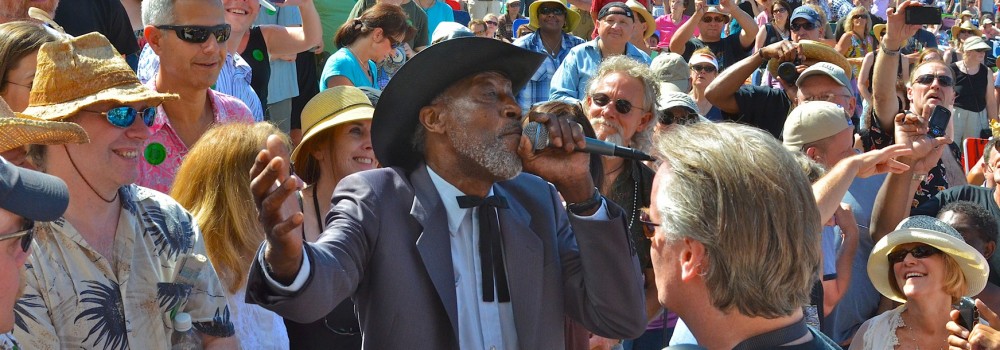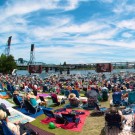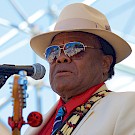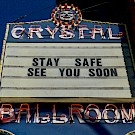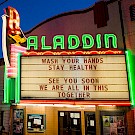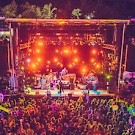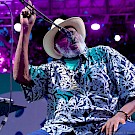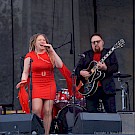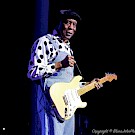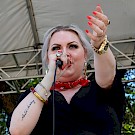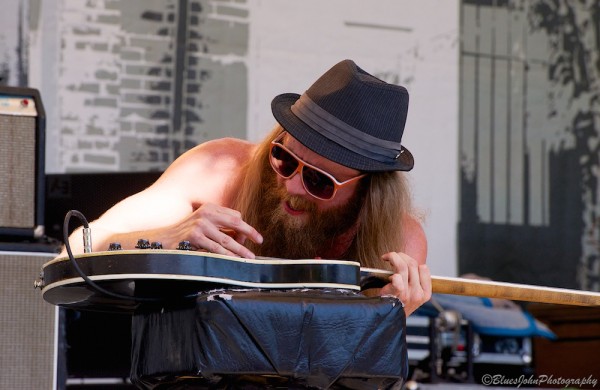 In 2013, multi-genre guitar slinger Scott Pemberton got the chance to show off his unique style at the biggest fest in his hometown: Portland’s annual Waterfront Blues Festival—click to see a whole gallery by John Alcala
In 2013, multi-genre guitar slinger Scott Pemberton got the chance to show off his unique style at the biggest fest in his hometown: Portland’s annual Waterfront Blues Festival—click to see a whole gallery by John AlcalaThe biggest names in blues and roots music have graced its stages—John Lee Hooker, Etta James, Taj Mahal, Robert Cray, Hubert Sumlin, Otis Rush, the Blind Boys of Alabama, even Led Zeppelin’s Robert Plant. The power of its draw has filled the coffers of the Oregon Food Bank to the tune of $9.5 million and 800 tons of food during its 25-plus-year run. And it’s become one of the largest, best-run and internationally lauded festivals in the United States.
The Waterfront Blues Festival, held annually over the long Fourth of July weekend along the banks of the mighty Willamette River in downtown Portland, has enjoyed the kind of sustained and satisfying success about which other festivals only dream. It would be juicy and salacious to tell a tale worthy of a sorrowful slow blues tune—mismanagement, greed, shady promoters, low production value. But no such story exists. Where many festivals enjoy a strong run but an inevitable shelf life that leads to extinction, the WBF has continued to build a strong national and international fan base by pushing the envelope to keep itself fresh, vital and, most importantly, sustainable.
Growing Pains
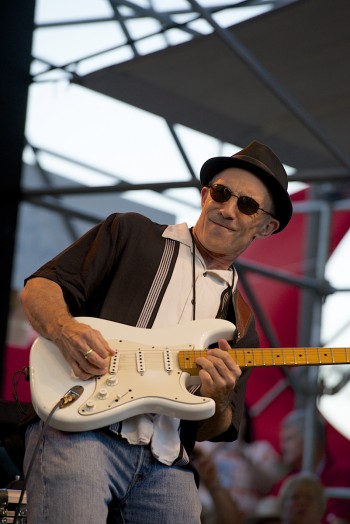 In his DNA: Beyond booking the fest, artistic director Peter Dammann also gets the opportunity to show off his musical chops
In his DNA: Beyond booking the fest, artistic director Peter Dammann also gets the opportunity to show off his musical chopsThe fest got its inauspicious start in 1987 as the Rose City Blues Festival, a one-day waterfront benefit sponsored by the Cascade Blues Association to help the Burnside Community Council. It featured a strong lineup of local talent including the Paul deLay Band, Curtis Salgado and his band The Stilettos, Norman Sylvester, the Lloyd Jones Struggle, Bill Rhoades and the Party Kings, pianist DK Stewart’s newly formed trio, the Mayther Brothers, Terry Robb and headliner John Lee Hooker, the Boogie King himself.
The festival morphed the following year when Oregon Food Share (now the Oregon Food Bank) became the producer and beneficiary, owning the event outright. First-year proceeds were $7,500 and 650 pounds of food. In 1991, the festival was renamed the Waterfront Blues Festival and the rest is music history.
In a genre where the artist base—not to mention the fan base—is aging, Stumptown’s ode to the blues rolls on with the momentum of a full-speed freight train. It hasn’t always been easy, and the future is difficult to predict, but come the Rose City’s first unofficial weekend of summer and day one’s downbeat in Tom McCall Waterfront Park, all is right with the world.
Taking the Stage
Festival artistic director Peter Dammann’s great-grandfather did logistics for the Union Army in the Civil War and served as an advisor to Abraham Lincoln. Dammann’s 15-year-old son Jesse, who was born well after Dammann took over the booking reins, brought that fact to light when he reported on quartermaster Montgomery Meigs for a class assignment. Booking a four-day, sometimes five-day, festival can be a logistical and budgetary nightmare. Dammann’s bloodline serves him well.
“It’s in my DNA,” says Dammann, who is also a renowned blues guitarist in his own right, having held the chair in the final iteration of the Paul deLay Band and who currently plays with Portland blues pianist DK Stewart among others. “It’s what I do.”
Dammann started with the fest in 1994, against the advice of fellow musicians. DeLay bandmate Louis Pain, a Portland Hammond B3 player who works steadily in both blues and jazz idioms, told him, “Don’t do it—people will hate you and it’s a lot of headaches,” Dammann recalls. After three attempts from OFB PR manager Dave Clingan to hire him, Dammann—who, at the time, owned a then-powerful Mac 512K computer and who knew how to write a press release—took the gig.
“It was exhilarating,” Dammann says. “I had a blast. And it’s not rocket science.” That may be true, but it is a constant challenge to find acts that will draw a strong cross section of attendees. Dammann’s life over the years has been and continues to be a mix of nearly yearlong phone calls, contracts and intricate spreadsheets of acts booked, fees, arrival schedules, accommodations and on-site logistics. Quartermaster Meigs would be proud.
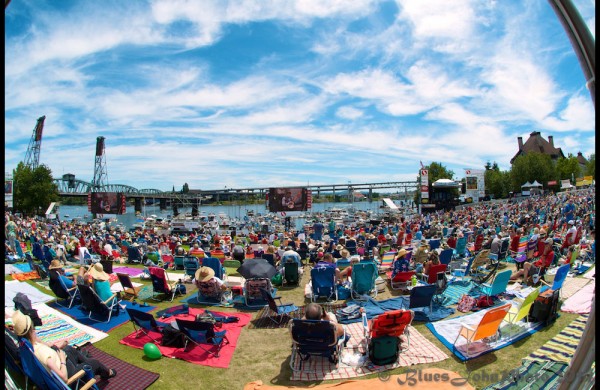 A scene from the 2014 Waterfront Blues Festival at Tom McCall Waterfront Park—click to see a whole gallery by John Alcala
A scene from the 2014 Waterfront Blues Festival at Tom McCall Waterfront Park—click to see a whole gallery by John AlcalaIt hasn’t always been easy. His first fest featured acts heavily in the Southern soul mode, including Little Johnny Taylor, Frankie Lee, Little Milton and Dorothy Moore, that didn’t totally resonate. To his credit, though, appearances by Elvin Bishop, Eric Burdon and Maria Muldaur rounded out the bill that included a total of 43 acts.
“Over the years,” he says, “I’ve learned to mix it up with acts [that are] not well known, undiscovered older guys, and acts that haven’t been here before that are under the radar.” Acts like the Alabama Shakes and Gary Clark Jr. were once “gettable,” and he got them, but they’ve since exploded and command huge festival appearance fees. The hunt is never-ending.
Dammann pays huge props to festival producer Clay Fuller, who came aboard early in the festival’s history and who pioneered the concept of giving ownership of the fest itself to the Oregon Food Bank, a concept not widely practiced. “It’s a total anomaly. Nobody knew what the Food Bank was,” Dammann says.
Fuller got the Cascade Blues Association and the city more heavily involved and wasn’t afraid to take chances and be creative. “We’ve done it by coming up with new elements, pulling out all the stops, finding new reasons to come. Clay has continued to push the envelope,” Dammann says. Fuller added stages (the A&E stage in 1999 and later the Crossroads stage for workshops, in addition to the two main stages), the popular and more intimate Willamette River cruises in 2003, and after-hours gigs around town. He also backed the somewhat controversial booking of Led Zeppelin’s Robert Plant in 2013 that many felt was too far afield for a blues fest but ultimately capped the biggest Waterfront Blues Festival weekend ever.
The City That Works
One might be given to thinking that an undertaking such as a fest of this size would have never gotten off the ground without the cooperation of city hall. And that is true. But, there is a single reason that a solid relationship exists between festival organizers and this city, and his name is Mike Lindberg.
Lindberg served on the Portland City Council from 1979-96. When Bud Clark took over as mayor in 1985, Councilman Lindberg asked for and got the commissions for Portland parks and arts. A longtime devotee of Portland live music, especially the blues, Lindberg had long wondered why there wasn’t more live music in Portland’s prevalent parks. Turns out former Mayor Frank Ivancie thought music in the parks a bad idea, one quickly turned around by Lindberg. He worked closely with the first Blues Festival organizers, including principal Delmark Goldfarb, to get the inaugural fest up and running, smoothing down an often serpentine and expensive city permitting and permission path.
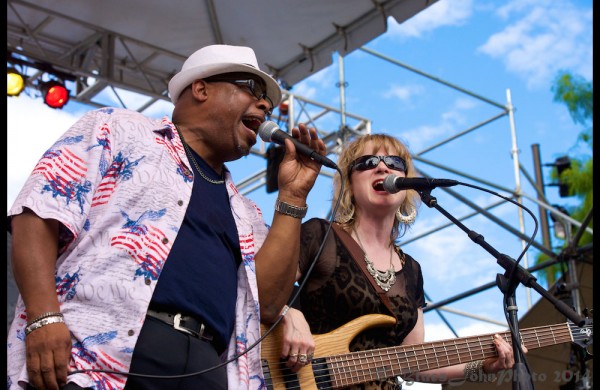 Andy Stokes and Lisa Mann at the 2014 fest
Andy Stokes and Lisa Mann at the 2014 festLindberg’s been aboard ever since. “The parks department has always had a role in giving approval, what can be charged, what can be waived,” he says. “From ‘87 on through to now, I’ve had weekly contact working with the Blues Festival and city, including serving on the advisory council, which I joined after I left [city council].”
To hear him tell it, it’s no big deal. “I’ve been fortunate,” Lindberg says. “It’s not like work. It’s a labor of love, and never a paid position. I’m just around and available.”
The city has seen and continues to see the value of this perfect combination of entertainment, helping the hungry—whose numbers in Oregon continue to soar—and the nearly utopian sense of community and togetherness that the annual event affords Portland.
For Lindberg, it is a generosity of spirit. “It’s the same people involved year after year—backstage, volunteers, musicians,” he says. “They set aside ego. Talk to Peter and Clay. They don’t care if their names are in the paper—they want no credit. It’s a whole bunch of people who have solidified around a common cause.”
With the Blues Festival, he says, “It’s hundreds of stories of people saying yes.”
Filling the Pantry
Jean Kempe-Ware can cite you chapter, line and verse, about hunger in Oregon. It was her job as PR director for the Oregon Food Bank, which she started in 2002 and retired from in 2013. But she was a fan of the fest well before she started her job promoting it to the public.
“My enthusiasm didn’t start when I started working there,” Kempe-Ware says. “I was already going to the festival. In fact, the first time I heard of the Oregon Food Bank was at the Blues Fest.”
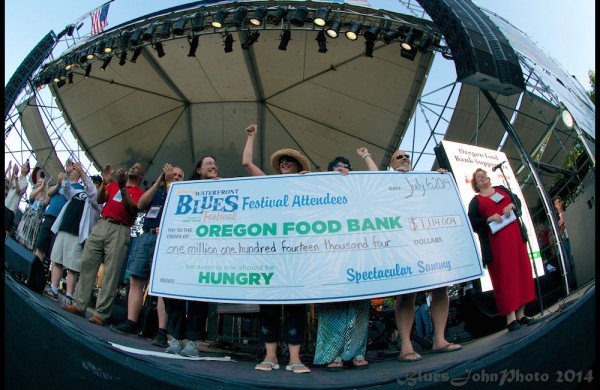 OFB check presentation on July 6, 2014
OFB check presentation on July 6, 2014Owning the festival has meant a great deal to OFB. “I do not think Oregon Food Bank could have existed and thrived and continued to serve people effectively without the funds that the festival brought in,” she says. “But it also brought huge awareness about OFB and the needs of people who are hungry to the general public, to music lovers, to people who were attending, and to people even beyond our state. It has ripple effects.”
Kempe-Ware gets misty when she recalls looking out at the sea of people year after year. “The times I looked over the audience and saw every economic strata, every ethnicity, every age, from kids to people in their 90s. Tears come to my eyes—look at this and how everyone comes together.”
But how does it work to go against the grain, to have a nonprofit that fights hunger actually own a major U.S. festival?
“It’s extremely rare,” Kempe-Ware says. “Most frequently nonprofits are beneficiaries. It doesn’t happen that a nonprofit, especially one fighting hunger, takes on the responsibility and risk of making a huge festival happen. It’s the second largest blues festival in the nation—not small potatoes, a huge festival. But it speaks volumes for the heart of the Portland community that we can come together and make this happen.”
Show Time
Maybe it’s too easy to over think this, make it too complicated, looking into the shadows for the potential for greed and corruption where none exists. Or even simply why this festival should have failed somewhere in its 27-year history. Maybe it’s a testament to the indescribable something that defines Portland, not in some comedic Portlandia way, but in a way that proves there is common good among the citizenry—that for a long holiday weekend we can come together to listen to some blues, pat each other on the back, and feed some hungry families who need a hand.
Portland pianist DK Stewart, who runs his own band as well as having done stints with Robert Cray, Paul deLay, Joe Louis Walker and others, played the first note of that first Blues Fest in 1987, an honor he cherishes. “The stats and details of how this event progressed over the years are probably some of the most historically significant representations of Portland’s grand assemblage of artistry to date,” he says.
Stewart has showcased his own bands but also served as a sideman to many blues troubadours. The fest, he says, has become “a highly prized Oregon brand that shows off the Rose City’s ability to go toe to toe with the East Coast and Gulf Coast’s finest artists. And it continues to get bigger and brighter each year. The times I’ve been honored to perform have always left me with a feeling of audience appreciation that you only get by traveling the world. And we do it right here.”
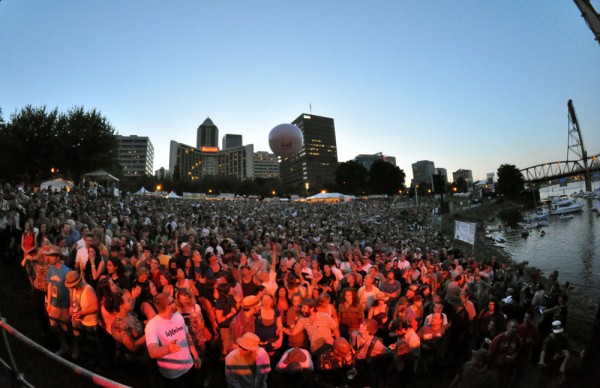 Photo by Kevin Tomanka
Photo by Kevin TomankaCome festival time, it’s old home week. Seasoned stage crews and volunteers and corporate sponsors and a rowdy music-loving crowd convene for a raucous yet tightly run weekend of stellar musical performances. There are no egos, only pride. According to Dammann—and Kempe-Ware and Lindberg and Fuller—it’s what happens when you really empower people. Though there are many moving parts, it all functions like a big family reunion.
Maybe it really is that simple.

